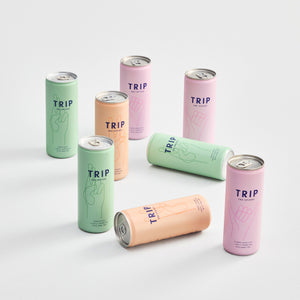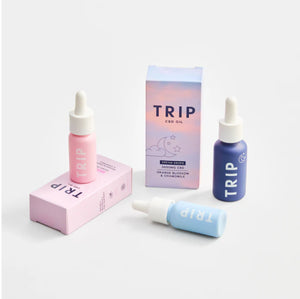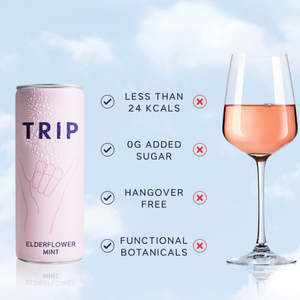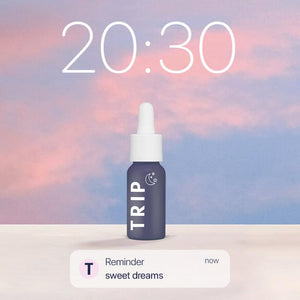If you haven’t heard of CBD by now, you’re certainly missing out! CBD (short for cannabinoid) is the non-psychoactive compound extracted from the hemp plant, and is found in a number of forms, including oil, drinks and gummies, in many supermarkets and health stores.
It’s important to note that this compound isn’t the same as THC (tetrahydrocannabinol). While CBD and THC originate from the same plant species, THC produces high feelings, which CBD does not!
How does CBD work?
Its effects are related to the body’s endocannabinoid system, a network of cells and receptors that regulates various cardiovascular, nervous and immune functions and helps control how the body achieves balance. When you consume CBD, whether that’s placing a drop of oil under the tongue, eating a gummy or enjoying one of TRIP’s CBD-infused drinks, it absorbs into your bloodstream and gets to work.
Five mental health uses for CBD
1. CBD for PTSD
PTSD (post traumatic stress disorder) can be a debilitating condition. Causing symptoms like intrusive thoughts, nightmares and sleep difficulties, these can lead to people suffering with poor mental health as a result. PTSD is most commonly associated with war veterans, however, anyone who has experienced a traumatic event can experience it— no one is immune from the impacts of trauma.
Although research into CBD and how it affects PTSD is minimal, one case study found that 12-37mg of oral CBD oil consumption lead to a reduction in anxiety symptoms and sleep disturbance for a ten-year old PTSD patient.
2. CBD for anxiety
Anxiety is a prevalent issue for lots of people, massively impacting how they function day-to-day. From our social interactions and relationships with people, to our sleep and eating habits, anxiety can cause a range of physical and mental symptoms, including fatigue, lack of concentration, and muscle tension.
Research revealed that “pretreatment with CBD significantly reduced anxiety, cognitive impairment and discomfort in their speech performance.” This study was carried out on individuals with social anxiety disorder (SAD), with half of participants receiving CBD and the other, a placebo — those receiving the placebo reported higher anxiety, discomfort and alert levels.
3. CBD for depression
Depression is one of the most common mental disorders around, affecting millions of people worldwide. One promising study found that seven days of CBD treatment “reduced mechanical allodynia, decreased anxiety-like behaviour, and normalised 5-HT activity.” This means that participants experienced fewer pain sensations from light touch, This is thought to be because CBD interacts with the serotonin receptor (5-HT) — although it doesn’t boost serotonin per se, its interaction is positive.
4. CBD for sleep difficulties
Find it hard to drift off to sleep at night? You’re not alone! Getting enough shut-eye is important not only for our bodies to rest, but our mind too. So much so that a lack of sleep can start to impact an individual’s mental state. Insomnia is also a symptom of mental health conditions, such as depression, anxiety and bipolar disorder.
Luckily, one of the possible benefits of adding CBD to your daily routine is that it can help you unwind and feel more like yourself before you go to bed.
5. CBD for epilepsy
The reasons aren’t completely understood yet, but epilepsy is related to a few mental health problems. The changes that occur in brain function in these different conditions tend to be similar, which is why they’re often linked. Living with epilepsy is not easy, and naturally, this may be the cause of an individual’s declining mental health. According to research, chronically ill people may “develop psychiatric disorders, most commonly depression and anxiety” due to the non-negotiable life changes that happen after diagnosis. A study in those diagnosed with Dravet Syndrome (a complex childhood epilepsy disorder), found that CBD saw a “50% reduction in convulsion-seizure frequency” for 43% of patients.
Types of CBD
There are three main types of CBD available:
- Isolate
This is a pure CBD crystal form that is ground up and sold as a powder. It’s suitable for first-time CBD users who want to discover the potential health benefits without worrying about THC content. However, compared to full-spectrum products, the effects may be less notable.
- Full-spectrum
Full-spectrum CBD contains all components of the hemp plant, including THC. It may provide a more potent effect than pure CBD due to its combination of compounds.
- Broad-spectrum
Similar to full-spectrum CBD, broad-spectrum products contain additional hemp compounds but with zero or trace amounts of THC. They also may have a higher likelihood of causing the purported health benefits because of the entourage effect.
For CBD products to be manufactured and sold in the UK, they must have less than 0.2% THC content by law.
Ways to consume CBD
CBD can be consumed in several ways. Most buyers opt for CBD oil that is taken sublingually by placing a dosage under your tongue. This method is simple, efficient and is the fastest way for it to reach your bloodstream. As it takes effect quicker than other forms of CBD, you might find this a preferable option. You can even add CBD oil to your morning smoothie or coffee for an extra pick-me-up, or incorporated into your baking recipes. That said, this way of consumption may take over an hour to kick in — the effects will likely last longer though. We have wild mint and orange blossom flavoured CBD oil at TRIP, meaning you don’t need to mix it with something else if you find the compound’s natural earthy taste a little unpleasant.
Is CBD safe for mental health use?
CBD is completely safe and legal to consume, however, there has been speculation over possible side effects and this can sometimes put people off. To reassure you, there have only been very few cases of this happening. Here at TRIP, we combine the compound with MCT oil, which actually has a number of potential benefits, from providing energy and helping to manage blood sugar levels.
All in all, it is definitely safe to use CBD products for mental health purposes — the research says so! If you are concerned about implementing it into your routine, consult with your GP or another relevant healthcare professional before you have your first dose as they can provide additional guidance for you to follow.


















